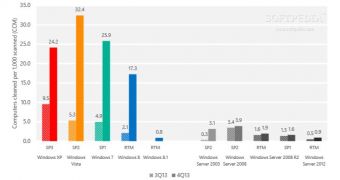Windows 7 has always been referred to as the much faster and more secure alternative to Windows XP, but it appears that the world's number one operating system is actually targeted by more infections across the web.
While that does make some sense given the fact that it's the most commonly-used operating system worldwide, Microsoft still emphasizes that Windows 7 users benefit from greater protection because their platforms are still getting updates and security patches, so those running XP should still consider upgrading as their only option.
Microsoft reveals some new stats regarding the number of infections aimed at each of its operating systems in Security Intelligence Report 16, confirming that more attacks are now launched against Windows 7 users.
As BetaNews reported, the infection rates, which are measured in computers cleaned per thousand, reached 25.9 percent for Windows 7, 32.4 percent for Windows Vista, and 24.2 percent for Windows XP.
“In general, infection rates for more recently released operating systems and service packs tend to be lower than infection rates for earlier releases, for both client and server platforms,” Microsoft said in the report.
“In 3Q13, this pattern is clearly visible, with Windows XP displaying an infection rate significantly higher than any other supported Windows client platform, and Windows 8 RTM—at the time the most recently released platform—displaying the lowest. In 4Q13, the typical pattern is affected by the elevated infection rates caused by Rotbrow, as Windows Vista SP2 displayed a slightly higher infection rate than Windows XP SP3.”
Of course, servers are a lot more secure because they're not being used to browse the web, Microsoft explained in the report, so the infection rate in this case remained very low.
“As in previous periods, infection rates tend to be significantly lower on server platforms than on client platforms. Servers are not typically used to browse the web nearly as frequently as client computers, and web browser features such as Enhanced Security Configuration in Internet Explorer discourage using servers to visit untrusted websites,” the company noted.
Another problem for Windows XP users is that Microsoft is no longer offering support for Security Essentials, the freeware anti-virus product that's available for pre-Windows 8 operating systems. On the other hand, the majority of security vendors have already confirmed extended support for Windows XP, so finding an anti-virus solution shouldn't be too difficult if you know exactly what you're looking for.

 14 DAY TRIAL //
14 DAY TRIAL //